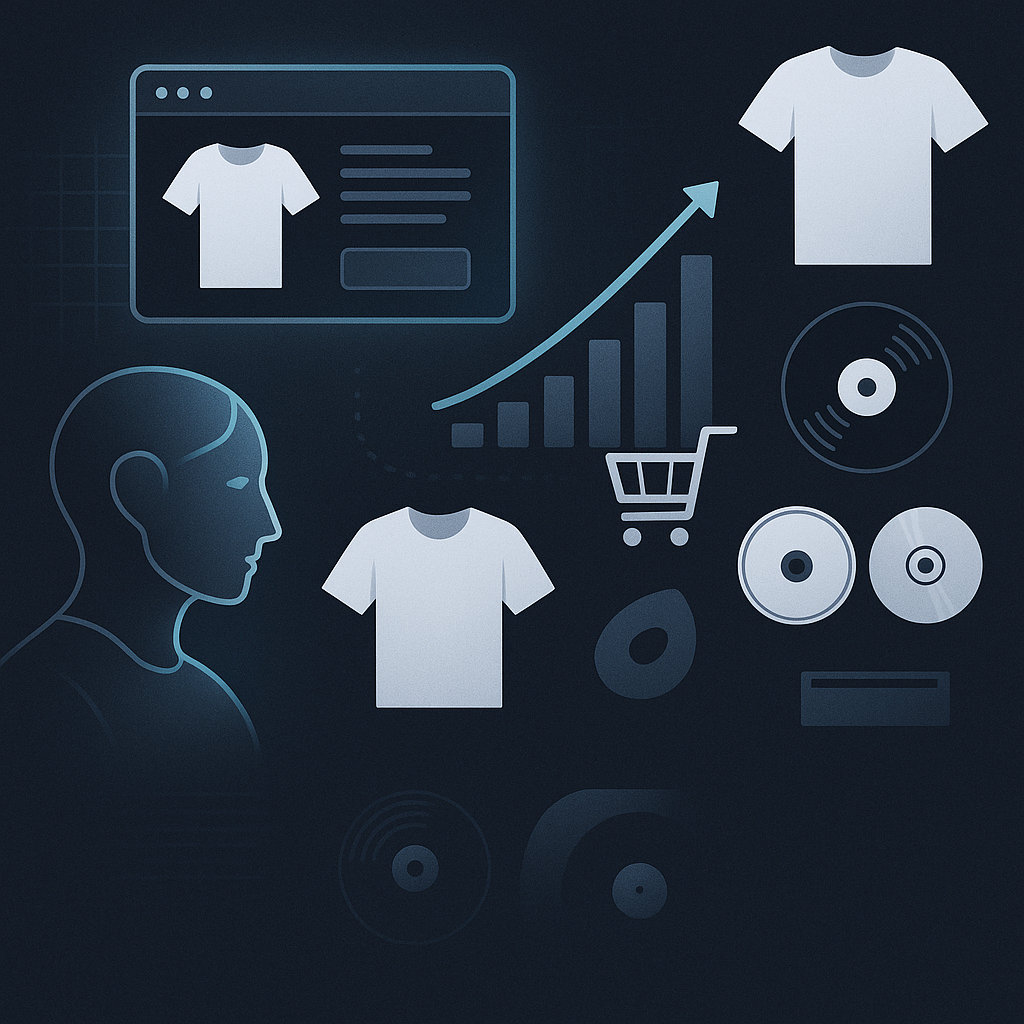How ChatGPT's Emerging Shopping Features Might Transform Music Merchandise — and How to Optimize for It
May 8, 2025

The evolution of artificial intelligence is rapidly reshaping how consumers discover and buy products online, and music merchandise is no exception. With OpenAI’s integration of shopping search features into ChatGPT, AI-driven product discovery is now emerging as a powerful force in e-commerce. For artists, labels, and entertainment companies, this shift represents both a massive opportunity and a strategic challenge.
What Is ChatGPT’s Shopping Feature?
In early 2025, OpenAI began rolling out a shopping-enhanced version of ChatGPT that allows users to search for and compare products directly within the chat interface. This experience is conversational, personalized, and intent-driven, users simply describe what they want ("Show me the best DJ Shadow hoodie") and receive curated links, images, and product listings sourced from across the web.
While still in its early stages, this technology signals a move away from traditional keyword-based search toward AI-guided commerce. Instead of sifting through 10 blue links on Google or navigating marketplaces like Amazon, users are beginning to rely on AI as a concierge, and that concierge might soon be the top of the funnel for music merchandise discovery.

SEO & AI Optimization Tips for Music Merch in ChatGPT
For artists, labels, and merchandisers, AI shopping will impact everything from brand visibility to conversion rates. Here’s how:
1. A New Discovery Channel
AI tools like ChatGPT are becoming primary interfaces for search, especially among younger, tech-savvy fans. If your merch isn't indexed and optimized for AI discovery, you’re potentially invisible in a major new channel.
2. The Long Tail Advantage
Niche and legacy artists can benefit disproportionately from AI shopping. Fans might search for "vintage hip-hop tour tees" or "psychedelic rock vinyl bundles," and ChatGPT will surface deep-catalog items, not just what's trending.
3. Personalized Merch Recommendations
With contextual AI understanding, ChatGPT may soon offer cross-sell and upsell opportunities based on user intent: "If you like DJ Shadow, check out this signed vinyl from Run The Jewels." This could redefine bundled merch strategies for entertainment brands.
SEO & AI Optimization Tips for Music Merch in ChatGPT
If you want your merch store to appear in AI shopping results, traditional SEO isn’t enough. Here’s what you need to do:
✅ Use Structured Data Markup
Implement schema.org markup on product pages. Include key properties like product name, description, brand, offers, availability, and image. This helps AI parse product data more accurately.
✅ Optimize Product Titles & Descriptions for Natural Language
Think conversationally. Instead of just “RTJ Hoodie” try “Run The Jewels - Black Hoodie.” Make it match how users might describe the item to an AI assistant.
✅ Host a High-Quality Storefront
Ensure fast load speeds, mobile responsiveness, clean URLs, and secure HTTPS. AI shopping pulls from trusted domains, and technical health plays a role in visibility.
✅ Regularly Publish Fresh, Relevant Content
Maintain an artist blog, news section, or product stories page with terms like “best merch for [artist] fans,” “exclusive tour items,” or “vinyl collector picks.” These long-tail phrases feed AI language models.
✅ Submit Feeds to Major Shopping Engines
Ensure your merch is listed in places like Google Shopping and Instagram Shop, which are often crawled by AI tools for product data aggregation.
Looking Ahead: What's Next?
As AI continues to evolve, it’s likely that ChatGPT (and competitors like Google Gemini and Meta AI) will start offering shoppable experiences integrated with payment solutions. Imagine a fan being able to say “Buy that new Glassnote Records vinyl for me” - and the AI completing the checkout on their behalf.
This future is no longer hypothetical. For music and entertainment brands, now is the time to lay the groundwork by aligning merch strategy with AI-optimized content, metadata, and UX. Those who act early will be positioned to capture a new era of direct-to-consumer discovery.
At Mainfactor, we’re helping artists, labels, and entertainment brands stay ahead of the curve, not just in fulfillment and marketing, but in preparing for the AI-powered future of commerce.
Want to learn more or audit your merch SEO for AI-readiness? Contact us.
Contact Us








